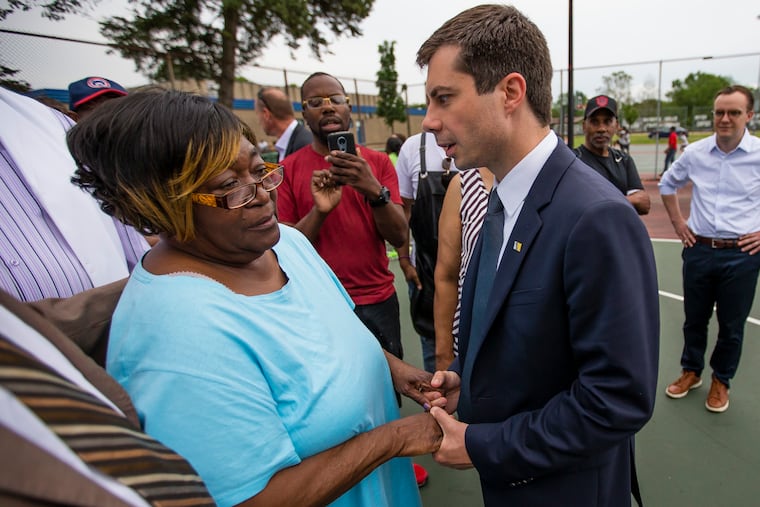Pete Buttigieg’s record on race should have been scrutinized earlier | Solomon Jones
Pete Buttigieg has a troubled — and undercovered — history with his city’s black community.

Democratic presidential candidate Pete Buttigieg is viewed favorably by about 40 percent of liberals and white Democrats, according to CNN polling. But as of last week, he was embroiled in the national wave of racial tensions over policing, after a white policeman shot and killed a black man in South Bend, Ind., where Buttigieg is mayor.
Sgt. Ryan O’Neill, the cop who shot 54-year-old Eric Jack Logan outside an apartment complex after claiming Logan pulled a knife, didn’t turn on his bodycam during the confrontation. Much of the black community there doesn’t believe the officer’s account. But O’Neill, who was investigated in 2008 over his alleged use of racist remarks, including referring to an African American woman as “black meat,” is not at the center of the controversy.
This is about Buttigieg. It is about his handling of a police force that is almost 90 percent white in a town that is 40 percent black and brown. It is about a black community whose deep mistrust of Buttigieg goes back at least eight years, and it is about media coverage that lavished praise on Buttigieg while largely ignoring his strained relationship with people of color — particularly when it comes to policing.
That’s especially galling after Philadelphians, including myself, fought to get 72 police officers assigned to desk duty pending an investigation of racist posts the officers allegedly published to Facebook. It’s insulting when black people continue to fight racism in policing in cities across the country. And it’s baffling because, in all the coverage I’ve seen about Buttigieg, much of it has centered on the fact that, if elected, he would be the first openly gay president. More important to me is his relationship with people of color in South Bend, the city where, as mayor, Buttigieg has appointed only white police chiefs (two total).
I asked CNN commentator and former Inquirer editor Roxanne Jones whether she’d seen much critical coverage of Buttigieg’s relationship with the black community before this month’s police shooting of a black man in South Bend.
“I’d seen zero,” Jones told me in a radio interview. “And I actually sat on a board of trustees at a college — a women’s college in South Bend, Ind., so I’m quite familiar with that area and was nervous every time I went there until I got to the campus grounds. That’s how thick the racial tension is there.”
The tension Jones felt in South Bend is reflected in the relationship between the community and the police.
In 2012, shortly after he became mayor, Buttigieg demoted the city’s first black police chief, Darryl Boykins, because federal investigators were probing whether the police department illegally recorded white officers making racist remarks in phone conversations.
Then, in a move reminiscent of then-Chicago Mayor Rahm Emanuel’s refusal for more than a year to release video of the police shooting of LaQuan McDonald, Buttigieg did not release the audiotapes of the allegedly racist phone calls.
When a federal jury found that Deshawn Franklin, an African American, had his rights violated when three white South Bend officers entered his home and handcuffed him, beat him, and shot him with a stun gun, the jury awarded the family just $18 in damages.
An outraged black community demanded in a petition that Buttigieg publicly apologize to the Franklin family. I couldn’t find any public record of Buttigieg’s delivering on that demand.
To make matters worse, the department has become less diverse on Buttigieg’s watch, yet none of this was emphasized in the coverage of him. In my view, that’s because the coverage of American politics is most often centered on the concerns of white people, not black people.
And let’s be honest. Plenty of white Democrats love Pete Buttigieg.
In an April 30 poll conducted by CNN, 44 percent of white Democrats had a favorable opinion of Buttigieg, while only 30 percent of nonwhite voters had a favorable opinion. And 46 percent of voters who identified as liberals viewed Buttigieg favorably.
Having heard Buttigieg’s story, I can see why liberals would be attracted to him. He is a veteran, he speaks several languages, he’s young, and his election would make him the first openly gay president.
Roxanne Jones, who cochaired the board of the Gay and Lesbian Alliance Against Defamation and who identifies as an ally of the LGBTQ community, thinks Buttigieg’s racial baggage was ignored amid focus on his sexual orientation, and a media narrative that this orientation makes him universally progressive.
“What happens in the gay community — especially the white male gay community — is that issues of race are always glossed over,” Jones told me. “And there’s a lot of racism within that community."
Jones is right. That’s why all of us — and especially people of color — must know where every candidate stands on the issues we care about most.
It shouldn’t take a police shooting to make us take a closer look.
Solomon Jones is the author of 10 books. Listen to him weekdays 7 to 10 a.m. on 900 AM/ 96.1 FM WURD. Email him at sj@solomonjones.com. On Twitter at @solomonjones1